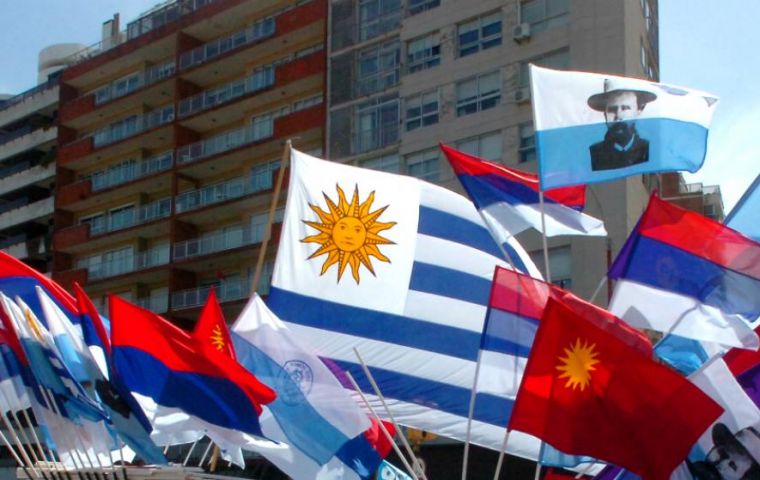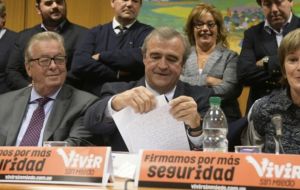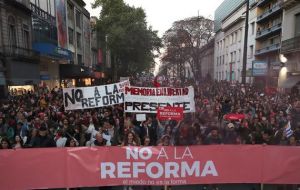MercoPress. South Atlantic News Agency
Uruguay Sunday’s general election: To a second ballotage and without parliamentary majority
 With these elections, the era of “tetrapartidism” is beginning in a country where the presidency had been historically debated practically between two political parties
With these elections, the era of “tetrapartidism” is beginning in a country where the presidency had been historically debated practically between two political parties  On Sunday Uruguayans will also choose to approve or not the constitutional reform “Living without fear” that promotes, among other issues, the creation of a national guard formed by military personnel
On Sunday Uruguayans will also choose to approve or not the constitutional reform “Living without fear” that promotes, among other issues, the creation of a national guard formed by military personnel  The movement “No to the reform” marched yesterday on the Montevideo’s avenue 18 de Julio and summoned thousands of people. The event was attended by the official candidate, Daniel Martinez.
The movement “No to the reform” marched yesterday on the Montevideo’s avenue 18 de Julio and summoned thousands of people. The event was attended by the official candidate, Daniel Martinez. On Sunday, October 27, in Uruguay, a new president, and Parliament will be elected. According to pollsters, the same parties as in 2014, the official Frente Amplio (FA, Broad Front) and the conservative National Party, will go on second ballotage in November. However, the novelty is that the Legislature will be made up of a minimum of six parties (a historical record) and a maximum of nine.
In addition, with the emergence of a far-right party such as the Cabildo Abierto, founded by the former Commander in Chief of the army, Guido Manini Ríos, with these elections the era of “tetrapartism” is beginning in a country in which the presidency had been historically debated between two political parties, until the arrival of the left-wing Frente Amplio coalition in 2004.
“Next Sunday, despite who likes it and who does not like it, the FA wins and with a parliamentary majority,” two times President Tabaré Vázquez predicted five years ago, in an electoral contest against Luis Lacalle Pou. The polls, days later, would prove him right against the forecasts of the pollsters.
Unlike the then-candidate and today president, the leftist candidate of these elections, former mayor of Montevideo Daniel Martínez, does not place so much emphasis on obtaining a parliamentary majority. In fact, in his speeches, he takes the opportunity to sow doubts to the governance of the eventual opposition coalition - a “Frankenstein” that “will have trouble hitting impeccable things,” according to his own words.
On the other hand, Lacalle, again as the National Party candidate, arrives on Wednesday in a more favorable position than in 2014, and is more confident to prevail at the polls. Although the polls draw a panorama in which a change of government is more likely than in the last contest, with an opposition that surpasses the Broad Front in the first round, they also mark that the National Party is below the intention of the vote they had in the previous election.
“I think there will be a minority Broad Front, which will be unable to make agreements with other parties and can only establish a parliamentary scheme if it is an absolute majority. Otherwise, you will not be able to get allies. And on this side, there will be a large majority of opposition parties with the opportunity to co-join,” said former Lacalle in a dialogue with El Observador.
In this way, Uruguay is heading for a paradox: whoever makes the government will surely do so with fewer legislators than those he obtained five years ago. The “whites” (National Party), who have “more chances of joining other parties for an eventual coalition”, could get the Presidency even losing a senator.
On the other hand, the Republican Colorado Party and its candidate, the economist Ernesto Talvi, has fallen drastically in this last section towards the elections to 11%, after reaching a peak of 18% in September.
“Guido Manini [Ríos] came to occupy a leadership that was orphaned, void of representation, which is that of the pure right, of conservative Catholicism,” said Bottinelli yesterday. That explains the “sustained growth in the intention to vote” that the new party had since May and that, to date, would make it the holder of three senators and between nine and ten deputies, the equivalent of 7% of the votes, according to Factum.
A reform for public safety under the slogan of “fear”
On Sunday Uruguayans will also choose to approve or not the constitutional reform campaign “Vivir sin miedo” (Living without fear) launched by the National Party senator, Jorge Larrañaga to modify aspects related to public security and that, although rejected by many of the presidential candidates (even Lacalle), has high citizen support and has polarized the population, according to surveys.
The proposal, which has taken special relevance in recent days with the social uprisings of Chile and Ecuador and the role of law enforcement in their repression, will create a national guard made up of 2000 military personnel. An issue that sweeps the historical flames in a country where a military regime ruled for 12 years during the '70s and '80s.
In addition, it proposes to implement the life imprisonment revisable to the penal code and to validate the night raids to the homes. Currently, in Uruguay, the maximum penalty is 30 years and applies in very exceptional cases.
The movement “No to the reform” marched yesterday on the avenue July 18 and summoned thousands of people. The event was attended by Martínez and Graciela Villar, candidate for vice president of the leftist coalition.




Top Comments
Disclaimer & comment rules-

Read all commentsHmmmmmmmmmmmmmmmm.....
Oct 23rd, 2019 - 10:35 pm 0I wouldn't be soooo sure about your Neo-Liberal analysis..., me dear MercoPress...
Factoring in the recent failure of the Neo-Liberal dogma in Perú..., Ecuador and Chile..., you could be in for a surprise...
Let's have a nice election Sunday...
Commenting for this story is now closed.
If you have a Facebook account, become a fan and comment on our Facebook Page!